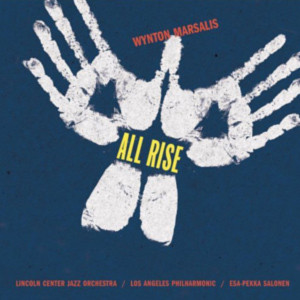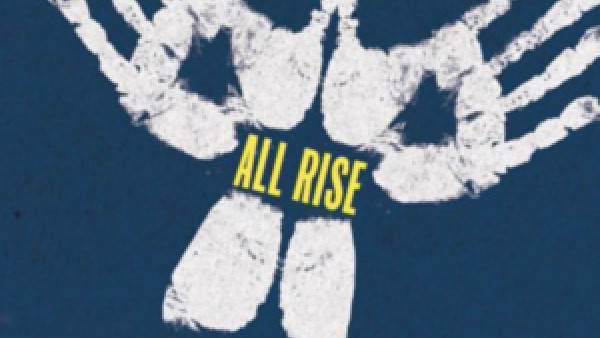A euphoric evening led by Wynton Masalis
When Wynton Marsalis’s début album appeared on CBS Records in 1982, with its moody, pensive black and white cover portrait of the then twenty-year-old trumpeter, few could have predicted where his career was headed. Sure, he had performed Hayden’s Trumpet Concerto with the New Orleans Philharmonic at fourteen, and further honed his craft in the trumpet chair of Art Blakey’s Jazz Messengers. But his early albums, as good as they were – and some, like Black Codes (From the Underground), were very good – proved far from ground-breaking affairs, exploring as they did the small group sound of Miles Davis’s classic quintet of the 1960s.
If Marsalis’s early music failed to break new ground, he certainly proved the right stuff for the CBS marketing department. With his good looks, trumpet virtuosity, leadership qualities, and a genre-jumping capacity for switching effortlessly between jazz and classical, he was promptly elevated to the next big thing, the leader of a pack of ‘young lions’ – a group that included Terence Blanchard, Christian McBride, Wallace Roney, Marcus Roberts, Roy Hargrove, and brother Branford – spearheading a return to acoustic jazz after a decade of fusion and funk experiments. For the first time in a while, swing was back on the menu.
Fast forward a few decades and the landscape looked far different. The sheer abundance and variety of Marsalis’s work was staggering: ballet scores, soundtracks, concerti, string quartets, the on-going Standard Time series, a seven-CD box of live recordings, and still there was time to head up New York’s Jazz at Lincoln Center. Not least among these achievements was his garnering a Pulitzer Prize in 1997 – the first ever awarded for a jazz score, and a mea culpa of sorts for the Pulitzer board, having denied it to Duke Ellington back in 1965 for his epic jazz opera Blood on the Fields.
Marsalis’s All Rise, which first premièred in the dying days of the last millennium, is of a corresponding scale to Blood on the Fields: a hundred-plus-minute work, cast in twelve movements, scored for orchestra, jazz ensemble, and a hundred-voice chorus. Now designated Symphony no. 1 (it has been followed by three more), it came at the end of a busy year that saw Marsalis release no fewer than ten recordings. Even his hero, the ever-productive Duke Ellington, might have been hard pressed to match that feat.
The gathering of musicians and singers assembled on stage at Hamer Hall, as the audience filed in, was formidable: the sixty-or-so musicians making up the Melbourne Symphony Orchestra (MSO) installed to the sides and back of the stage; the fifteen-member Jazz at Lincoln Centre Orchestra front and centre; and the nearly hundred-strong choir arranged in the upper wings and the elevated rear of the stage. By the time conductor Benjamin Northey strode onto the stage, there was a palpable air of expectation that we were in for something special.
The first movement ‘Jubal Step’ began with the choir repeatedly singing ‘Ah Zum’ – a phrase intended to denote the beginning and end in an instant – their voices swelling to a sustained cacophony over dense percussion and strident brass. The strings, when they entered, manifested a dancing quality, filled with joyous urgency that recalled Stravinsky’s use of folk forms in his early ballets. The second movement, ‘A Hundred and a Hundred, a Hundred and Twelve’, shifted gear, its playful approach animated by the jazzy scores of George Gershwin, breezy lounge, the soft shuffle of bossa nova.
All Rise, cast in the form of a twelve-bar blues, is omnivorous in the way it ranges across a century’s jazz, popular, and orchestral music, drawing upon ragtime, blues, spirituals, Latin grooves, folk forms, alongside the work of American composers, most notably Ellington, but also Gershwin, Aaron Copland, Charles Ives, Leonard Bernstein, Gil Evans. At the same time, it conjures the rhythmic sound of trains, wide open spaces, the streets of Storyville. Like a vast patchwork quilt, it has been woven together from scraps of musical cloth – conveying something of jazz’s boundless capacity to absorb and adapt diverse musical styles – with some elements working in harmony, others in conflict.
Of course, not everything worked. The romantic string flourishes and easy-going swing heard in the third movement, ‘Go Slow (But Don’t Stop)’, felt like a misstep. But this was more than made up for by the sheer intensity of the fifth movement, ‘Save Us’, fueled by insistent drums, rhythmic surges, cacophonous passages, wailing voices, discordant saxophones, before being rounded out with a stormy trumpet solo. The opening of the sixth movement, ‘Cried, Shouted, Then Sung’, summoned the classic blues of ‘St James Infirmary’, its dirge-like funeral march animated by blaring clarinet, tambourine, squalling trumpet, rising to a choral chant of ‘Freedom’.
The Jazz at Lincoln Center Orchestra lived up to its reputation as supreme interpreters of this music, its garrulous horns meshing in seamlessly with the strings and percussion of the MSO. The large chorus – massive in sound – was used sparingly but always to dramatic effect, heightening the emotive reach of the music. Michelle Nicolle, a renowned local jazz vocalist, was a standout, her resounding gospel cry of ‘I Say All Rise’ piercing the soul.
All Rise strives for universal themes, embracing joy, pain, sacrifice, and redemption. While its origins lay in a form of music birthed in New Orleans more than a century ago, it roams widely, stylistically endeavouring to blend musical differences into a harmonious whole. Of the many influences present, however, it was the music of Ellington that informed much of its spirit. The dramatic final movement, with its chant of ‘I Am’, sought to bind together the many elements, seeking divine resolution. If the brief coda, with its folksy New Orleans swing, overplayed the composer’s hand, it seems only right to cut him a little slack, in the light of his own family’s long affinity with that city.
Marsalis’s past tendencies toward polemical statements when interviewed – and anyone who has watched Ken Burns’s ten-hour documentary series Jazz will know what I mean – has done him few favours. But the simple fact is, his career belies the neo-conservative tag often levelled at him, despite its being one he has often encouraged. I remember seeing him at the New Orleans Jazz & Heritage Festival in 1997, when his septet delivered a breath-taking, hour-long arrangement of John Coltrane’s masterpiece A Love Supreme – far from the act of someone scornful of jazz’s avant-garde tradition. Jazz at Lincoln Center meanwhile has found room in its program to champion the music of Ornette Coleman, Coltrane, and Charles Mingus, elevating their work to the forefront of twentieth-century composition.
In casting a glance back over Marsalis’s forty-plus-year career to date, one is tempted – paraphrasing Walt Whitman – to assert that he indeed contains multitudes. Despite his musical stature, it was humbling to witness his modesty during this performance at Hamer Hall, seated as he was, near-anonymously, amongst the trumpet chairs, contributing brief solos when called for, refusing to grandstand. Only at the very end of the evening, with encouragement, did he step forth to acknowledge and accept the audience accolades. One sensed that we, as audience, were honouring not just a performance, but a life lived in music.
All Rise strives for universal themes, embracing joy, pain, sacrifice, and redemption. While its origins lay in a form of music birthed in New Orleans more than a century ago, it roams widely, stylistically endeavouring to blend musical differences into a harmonious whole. Of the many influences present, however, it was the music of Ellington that informed much of its spirit. The dramatic final movement, with its chant of ‘I Am’, sought to bind together the many elements, seeking divine resolution. If the brief coda, with its folksy New Orleans swing, overplayed the composer’s hand, it seems only right to cut him a little slack, in the light of his own family’s long affinity with that city.
Marsalis’s past tendencies toward polemical statements when interviewed – and anyone who has watched Ken Burns’s ten-hour documentary series Jazz will know what I mean – has done him few favours. But the simple fact is, his career belies the neo-conservative tag often levelled at him, despite its being one he has often encouraged. I remember seeing him at the New Orleans Jazz & Heritage Festival in 1997, when his septet delivered a breath-taking, hour-long arrangement of John Coltrane’s masterpiece A Love Supreme – far from the act of someone scornful of jazz’s avant-garde tradition. Jazz at Lincoln Center meanwhile has found room in its program to champion the music of Ornette Coleman, Coltrane, and Charles Mingus, elevating their work to the forefront of twentieth-century composition.
In casting a glance back over Marsalis’s forty-plus-year career to date, one is tempted – paraphrasing Walt Whitman – to assert that he indeed contains multitudes. Despite his musical stature, it was humbling to witness his modesty during this performance at Hamer Hall, seated as he was, near-anonymously, amongst the trumpet chairs, contributing brief solos when called for, refusing to grandstand. Only at the very end of the evening, with encouragement, did he step forth to acknowledge and accept the audience accolades. One sensed that we, as audience, were honouring not just a performance, but a life lived in music.
All Rise ranks as a high-water mark in a compositional career studded with high-water marks, and Melbourne was fortunate to be afforded this rare opportunity to witness such a spirited performance – especially when taking into consideration the vast forces required to mount the work. On this occasion – and it is worth noting that both Melbourne performances sold out well in advance – the combined forces of Wynton Masalis, the Lincoln Center Jazz Orchestra, the MSO, the MSO chorus, the Consort of Melbourne, conductor Benjamin Northey, singers Michelle Nicolle and Emma Pearson, joined together to deliver a concert that will long live in memory, thoroughly meriting the lengthy standing ovation it received on the night. As a wave of euphoria spread through the hall, it appeared few were left untouched by the sheer power and magic of this music.
All Rise (Lincoln Center Orchestra and the Melbourne Symphony Orchestra) was performed at Hamer Hall on 25 and 26 August 2023. Performance attended: 25 August.
by Des Cowley
Source: Australian Book Review


